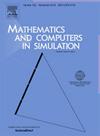丰富的物理信息神经网络动态泊松-能-普朗克系统
IF 4.4
2区 数学
Q1 COMPUTER SCIENCE, INTERDISCIPLINARY APPLICATIONS
引用次数: 0
摘要
本文提出了一种无网格深度学习算法,称为丰富物理信息神经网络(EPINNs),用于求解具有强耦合和非线性行为的动态泊松-能思-普朗克(PNP)方程。EPINNs建立在传统的物理信息神经网络(pinn)的基础上,通过引入自适应损失权值机制,该机制在训练过程中根据最大似然估计自动调整损失函数的权值,以实现平衡优化。此外,还引入了重采样策略来加速损失函数的收敛。最后给出了四个数值算例,验证了该方法的有效性。结果表明,与传统数值方法相比,epinn在求解此类耦合非线性系统方面具有更好的适用性。此外,epinn在精度、稳定性和速度方面优于传统的pin n。这项工作为求解具有任意边界形状和条件的PNP方程提供了一个强大而有效的数值工具。本文章由计算机程序翻译,如有差异,请以英文原文为准。
Enriched physics-informed neural networks for dynamic Poisson-Nernst-Planck systems
This paper proposes a meshless deep learning algorithm, called enriched physics-informed neural networks (EPINNs), to solve dynamic Poisson-Nernst-Planck (PNP) equations characterized by strong coupling and nonlinear behaviors. EPINNs build upon traditional physics-informed neural networks (PINNs) by incorporating an adaptive loss weight mechanism, which automatically adjusts the weights of the loss functions during training, based on maximum likelihood estimation, to achieve balanced optimization. Additionally, a resampling strategy is introduced to accelerate the convergence of the loss function. Four numerical examples are presented to demonstrate the validity and effectiveness of the proposed method. The results show that EPINNs have better applicability than traditional numerical methods in solving such coupled nonlinear systems. Furthermore, EPINNs outperform traditional PINNs in terms of accuracy, stability, and speed. This work provides a robust and efficient numerical tool for solving PNP equations with arbitrary boundary shapes and conditions.
求助全文
通过发布文献求助,成功后即可免费获取论文全文。
去求助
来源期刊

Mathematics and Computers in Simulation
数学-计算机:跨学科应用
CiteScore
8.90
自引率
4.30%
发文量
335
审稿时长
54 days
期刊介绍:
The aim of the journal is to provide an international forum for the dissemination of up-to-date information in the fields of the mathematics and computers, in particular (but not exclusively) as they apply to the dynamics of systems, their simulation and scientific computation in general. Published material ranges from short, concise research papers to more general tutorial articles.
Mathematics and Computers in Simulation, published monthly, is the official organ of IMACS, the International Association for Mathematics and Computers in Simulation (Formerly AICA). This Association, founded in 1955 and legally incorporated in 1956 is a member of FIACC (the Five International Associations Coordinating Committee), together with IFIP, IFAV, IFORS and IMEKO.
Topics covered by the journal include mathematical tools in:
•The foundations of systems modelling
•Numerical analysis and the development of algorithms for simulation
They also include considerations about computer hardware for simulation and about special software and compilers.
The journal also publishes articles concerned with specific applications of modelling and simulation in science and engineering, with relevant applied mathematics, the general philosophy of systems simulation, and their impact on disciplinary and interdisciplinary research.
The journal includes a Book Review section -- and a "News on IMACS" section that contains a Calendar of future Conferences/Events and other information about the Association.
 求助内容:
求助内容: 应助结果提醒方式:
应助结果提醒方式:


